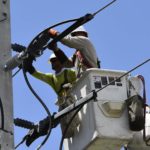VERO BEACH — The increase to electric base rates, which city officials assert will result in lower bills with a new power provider, moved one step further on Tuesday when council members voted to schedule a public hearing on Dec. 1.
At least one Council member declared he will not vote for the raise in rates.
“I absolutely will not vote for an increase at this time,” Council member Charlie Wilson told acting Electric Utility Director John Lee.
However, the new rate was structured, in part, to free county users from the 10 percent surcharge they pay over city residents. If the rates are not raised then county residents will continue to pay a surcharge that many have likened to taxation without representation.
The plan is the first adjustment of the base rate structure since 1991 and signals a major shift in the way the charges will appear on customers’ bills.
Currently, bills show a base rate that includes about $30 which actually pays for fuel. Another line item called “fuel cost adjustment” is a catch-all where many other expenses have been lumped in.
The new “base rate,” which will be 12.5 percent higher than the current base rate, is each customer’s share of the operating expenses of the utility, including capital and maintenance expenses, salaries and benefits and the utility’s $8 million contribution to the general fund in direct transfers and administrative costs.
Bills will still include a line called “fuel cost adjustment,” but that line, theoretically, will now include only costs for fuel.
Lee continues to state that the net result of the restructuring will be a 20 to 25 percent decrease in overall electric bills.
Under the new plan, if the anticipated savings in power costs pan out, a person inside the city now paying $158.82 per month for 1,000 kWh would pay $125.95 per month, before taxes. An out-of-city resident now paying $166.43 per month for the same 1,000 kWh would pay the same $125.95 per month, before taxes, under the new rates, for a savings of $40.48 per month.
Brian Heady stated that he is opposed to a rate increase, but, after having the plan explained to him in more detail, he feels it is a rate restructuring.
“I will not vote for a base rate increase, I will vote for a rearrangement of the fees that puts county residents on equal standing with those in the city,” Heady said.
This savings is highly dependent on the cost of fuel coming in as expected and it will not be seen until February, as Lee said the city will receive its last bill from the Florida Metropolitan Power Agency in mid-January and those fuel costs will show up on bills sent to customers at the end of January. The first bills that would reflect the new fuel costs would be mailed out at the end of February.
Councilman Tom White noted that the savings projected for customers using 2,500 kWh is not as much as what was originally promised when council looked at the results of the rate study over the summer.
“I was expecting instead of $45 savings more like $112 savings based on what we were told would be the reduction of the utility bills,” White said.
Lee answered that the rate per kWh for 1,000 to 2,500 kWh is more expensive, both to encourage conservation and to give a break to customers who do not use much electric. The average city residential customer uses 1,100 kWh of power per month.
“I’m sorry, but I’m getting a little cynical about this,” White responded, and added later on in the discussion, “convince me after I see the reduction of my electric bills.”
Despite discussion by several members of the council about postponing the implementation of the new rates, including the increased base rate, it was decided to schedule a public hearing on Dec. 1.
The only way to convert out-of-city customers to a rate that is equal with those in the city is to pass the whole new rate plan, according to staff.
At the Dec. 1 meeting the council has the right to approve, deny or table the new ordinance. The council can also approve it but delay the effective date.





